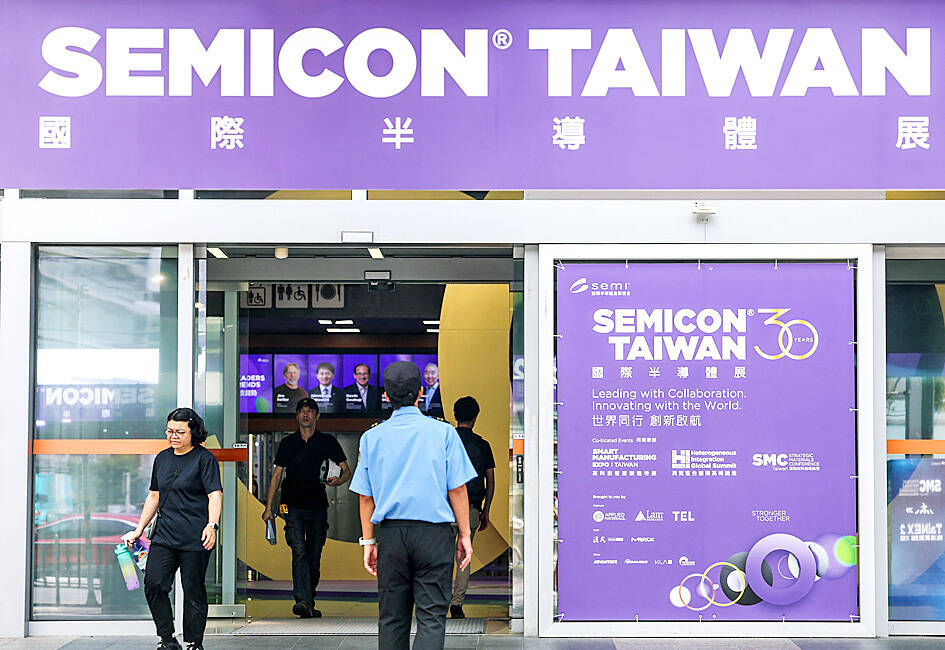Japanese geoeconomist Satoshi Inomata yesterday called for semiconductor collaboration between Taiwan and Japan, saying the two sides working together could “exert geo-economic powers” better safeguarding their economic security.
“Taiwan and Japan ... can be an extremely strong pair to exert geo-economic powers over the region using semiconductor supply chains,” Inomata, a senior researcher at the Institute of Developing Economies in Japan, said at a forum on the sidelines of the Semicon Taiwan trade show in Taipei.
Borrowing from military terminology, Inomata said economic partnerships among like-minded countries, such as “friend-shoring” — a trade practice where supply chain networks are focused on countries regarded as political and economic allies — could serve as a form of “deterrence by denial.”

Photo: I-Hwa Cheng, AFP
According to Inomata, such partnerships should help prevent shortages in individual countries through measures such as sharing information on supply capacities and even critical supplies.
He added that these measures would reduce the impact of economic coercion from opponents, including export restrictions, thereby discouraging them from taking hostile actions.
His comments came as panelists at the forum noted that the semiconductor sector has become increasingly intertwined with national security strategies.
Semiconductor policy will increasingly be shaped by global security policies and the broader international security landscape, as the two become ever more closely linked, said Peter Fatelnig, a digital economy policy official from the European Union delegation to Japan.
Philip Wong (黃漢森), a professor of engineering at Stanford University, said that as semiconductors become a battleground between nations, collaboration among private companies remains critical and is increasingly dependent on “trust.”
This was partly due to shifting dynamics between fabless chip firms and foundries, he said, noting that the design and manufacturing sides were increasingly collaborating on chip co-optimization and co-design.
“A high degree of trust is required” when companies involved have to share their industrial roadmaps, such as technology and production plans, added Wong, who also serves as chief scientist at Taiwan Semiconductor Manufacturing Co (台積電), an advisory role at the world’s largest contract chipmaker.

Sweeping policy changes under US Secretary of Health and Human Services Robert F. Kennedy Jr are having a chilling effect on vaccine makers as anti-vaccine rhetoric has turned into concrete changes in inoculation schedules and recommendations, investors and executives said. The administration of US President Donald Trump has in the past year upended vaccine recommendations, with the country last month ending its longstanding guidance that all children receive inoculations against flu, hepatitis A and other diseases. The unprecedented changes have led to diminished vaccine usage, hurt the investment case for some biotechs, and created a drag that would likely dent revenues and

Macronix International Co (旺宏), the world’s biggest NOR flash memory supplier, yesterday said it would spend NT$22 billion (US$699.1 million) on capacity expansion this year to increase its production of mid-to-low-density memory chips as the world’s major memorychip suppliers are phasing out the market. The company said its planned capital expenditures are about 11 times higher than the NT$1.8 billion it spent on new facilities and equipment last year. A majority of this year’s outlay would be allocated to step up capacity of multi-level cell (MLC) NAND flash memory chips, which are used in embedded multimedia cards (eMMC), a managed

CULPRITS: Factors that affected the slip included falling global crude oil prices, wait-and-see consumer attitudes due to US tariffs and a different Lunar New Year holiday schedule Taiwan’s retail sales ended a nine-year growth streak last year, slipping 0.2 percent from a year earlier as uncertainty over US tariff policies affected demand for durable goods, data released on Friday by the Ministry of Economic Affairs showed. Last year’s retail sales totaled NT$4.84 trillion (US$153.27 billion), down about NT$9.5 billion, or 0.2 percent, from 2024. Despite the decline, the figure was still the second-highest annual sales total on record. Ministry statistics department deputy head Chen Yu-fang (陳玉芳) said sales of cars, motorcycles and related products, which accounted for 17.4 percent of total retail rales last year, fell NT$68.1 billion, or

In the wake of strong global demand for AI applications, Taiwan’s export-oriented economy accelerated with the composite index of economic indicators flashing the first “red” light in December for one year, indicating the economy is in booming mode, the National Development Council (NDC) said yesterday. Moreover, the index of leading indicators, which gauges the potential state of the economy over the next six months, also moved higher in December amid growing optimism over the outlook, the NDC said. In December, the index of economic indicators rose one point from a month earlier to 38, at the lower end of the “red” light.